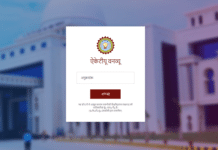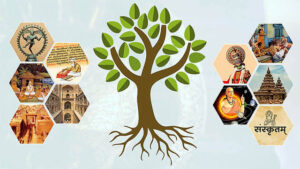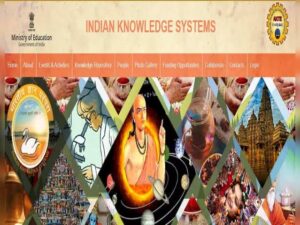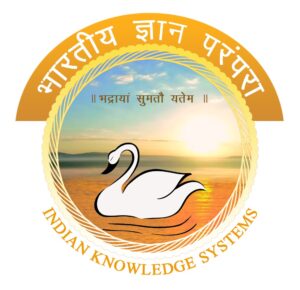INTRODUCTION:
“We owe a lot to ancient Indians, teaching us how to count. Without which most modern scientific discoveries would have been impossible”
~ Albert Einstein
Recently, the Indian Knowledge System has taken a prominent position in academic circles throughout the length and breadth of the Indian academic environment, it is because of the National Education Policy 2020 which has laid significant impetus upon the ideals of Guru-Shishya Parampara (mentor and student relation) which is of tremendous importance in the Indian thought system which is being transferred to generations through the medium of verbal traditions, scriptural knowledge and customs. And as soon as this step was incurred under the aegis of NEP 2020, it has become controversy’s favorite child as there are specific wings which are pelting stones of disagreement with the induction of this step and labeling it as a pogrom which lays specific value to teach on “How to become a sincere Hindu” but does it really emits the light of religious supremacy or has it been a step in the right direction- how can teaching about Indian Knowledge System help students when we already have plethora of other subjects to look after in the academic journey of a child. Is this an added baggage of penetrated values of the distant past which holds no practical significance in today’s time? Let us delve deeper into this aspect.

CRITICAL ANALYSIS:
India, Indigenous and Indic values, knowledge and insights in the enigmatic world which forms the very cornerstone for precursory glance into the conception of humanity on the face of earth is of tremendous importance. Indian Knowledge system is a wide syllable terminology which encompasses a wide array of ethical imperatives from the Vedic times to the upanishadic knowledge and subsisting with the Prasthāna texts, the core essence of these texts is to teach how to become an adept leader, management of emotions, psychology of mind, characteristics of dharma and dharma is not being dubbed under the chandelier of religion but it means duty which is not forced upon the individual but it has been willed by the individual on the basis of his competencies and relative attributes. This segment teaches not only human-centeredness but also about economic development principles as well, such as the IKS Division, in their research proposals has issued the following topics, which are as follows:
“IKS approaches for development and management of water resources, IKS approaches to conserve biodiversity and ecological protection, Indian sports and martial arts, Architectural engineering, town planning, civil engineering, Vaastu and Shilpa Shastra, Sustainable agriculture and food preservation methods, Novel materials, metallurgy and material sciences” these are not just the topics to discover and explore but they find their currency within the deep fragments of Indian thought process that entails lessons about polity, governance, women empowerment, quantum physics, thermodynamics and medicine such as the surya siddhanta, rasayan shastra, nyay-siddhant-mukhtavali, debate between Yamraj and yudhisthir that surfaces the importance of dharma, logic and analytical reasoning. From the sulba sutra to chanakya niti all are the living testament that this innovative step towards an all-round, dynamic development having exponential results for nation creation and innovation is what teaching about IKS will result in. It does not brainwashes the young minds but it disseminates knowledge on how to become an adept orator, a skilled craftsman, devoted student, inquisitive in nature and a good human that will in turn make this nation a developed one.
This “tracing our roots” policy has been emphasized by the Government of India so much so that Ministry of Education has established its own wing called as the Bhāratīya Jñāna Paramparā Vibhāga or Indian Knowledge Systems (IKS) Division of Ministry located in All India Council for Technical Education (AICTE) which is a statutory authority that is established for the management of integrated technical education system in the country- it shows that how these timeless verbatims of the glorified past play a significant role in the present-day technical society where everything is just a tip-away from a person. As per the act: “To provide for…proper planning and coordinated development of the technical education system throughout the country, the promotion of qualitative improvement of such education in relation to planned quantitative growth” this is a testament in itself of the vital role Indian Knowledge system is playing in contemporary world scenario where proper management skills, integration and cooperative behaviors set the necessary requirements for a person to excel in his/her domain and AICTE chose to recommend Indian Knowledge System, i.e. the principles of leadership- of sustenance- of dutifulness and that of persistence which the rich philosophic culture present within India subcontinent since time immemorial.
CONCLUSION:
The IKS Division has the objective is “To promote interdisciplinary research on all aspects of “Indian Knowledge Systems”, preserve and disseminate “Indian Knowledge Systems” for further research and societal applications.” To make it more student friendly, this scheme of principles are not just categorically applied on the professors and educators, rather, it bridges the rigid difference present between the teacher and student, and it has launched its own IKS Research Internship, Fellowship, Centers and various other funding opportunities where the teacher and student will work a project which is proposed by their team and they will collaborate to initiate a research over the same; it cuts of the traditional demarcated line between the professor and student by putting them as one single force to learn, evolve and
grow together.
For example, recently, Hansraj College’s Philosophy Department also established the Indian Knowledge Division within the college premises which is tasked to regulate, study, and maintain a critical appreciation of the contextualized scripts stemming from the Indic knowledge. It exemplifies the team-spirit, dedication and creativity that comes from within when different people work as one single team with having one single motive in their mind, and that is of resurgence of knowledge which can shape our future; because to go forward, we need to take few steps backwards- just like a marathon runner- like a lion. IKS gives us precisely this opportunity to develop a thorough understanding of the past, build upon our pre-existing knowledge and craftly design our future i.e. the future of India for becoming a “Viśvaguru” and successfully achieve the glorious objective of “Viksit Bharat @2047”.
References:
1. The All India Council for Technical Education Act 1987
2. IKS Research Center Proposals Program 2023-24
3. https://iksindia.org/2023-2024_BGSamposhana_Research_Final_25Jun23.pdf
4. Indian Knowledge system division website link: https://iksindia.org/about.php
5. https://www.linkedin.com/pulse/relevance-indian-knowledge-system-present-scenario-sakshi-vermani/
6. An introduction to Indian Philosophy, S.C Chatterjee.
7. https://indiafoundation.in/articles-and-commentaries/ancient-indian-knowledge-systems-and-their-relevance-today-with-an-emphasis-on-arthasastra/
Idea Of Women In Patriarchal History





















